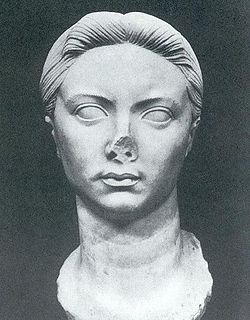Related Research Articles

AD 14 (XIV) was a common year starting on Monday of the Julian calendar. At the time, it was known as the Year of the Consulship of Pompeius and Appuleius. The denomination AD 14 for this year has been used since the early medieval period, when the Anno Domini calendar era became the prevalent method in Europe for naming years.

Plautia Urgulanilla was the first wife of the future Roman Emperor Claudius. They were married circa 9 AD, when he was 18 years old. Suetonius writes that they were divorced in 24 AD on the grounds of 'her scandalous love affairs and the suspicion of murder.

Publius Quinctilius Varus was a Roman general and politician under the first Roman emperor Augustus. Varus is generally remembered for having lost three Roman legions when ambushed by Germanic tribes led by Arminius in the Battle of the Teutoburg Forest, whereupon he took his own life.

The gens Fabia was one of the most ancient patrician families at ancient Rome. The gens played a prominent part in history soon after the establishment of the Republic, and three brothers were invested with seven successive consulships, from 485 to 479 BC, thereby cementing the high repute of the family. Overall, the Fabii received 45 consulships during the Republic. The house derived its greatest lustre from the patriotic courage and tragic fate of the 306 Fabii in the Battle of the Cremera, 477 BC. But the Fabii were not distinguished as warriors alone; several members of the gens were also important in the history of Roman literature and the arts.

Vipsania Agrippina was the first wife of the Emperor Tiberius. She was the daughter of Marcus Vipsanius Agrippa and Pomponia Caecilia Attica, thus a granddaughter of Titus Pomponius Atticus, the best friend of Cicero.
Marcus Aemilius Lepidus was a Roman senator, politician and general, praised by the historian Tacitus.
Sextus Appuleius is the name of four figures during the 1st century BC and 1st century AD. The first Sextus Appuleius was married to Octavia Major, the elder half-sister of Augustus. The three subsequent figures named Sextus Appuleius are respectively the son, grandson and great-grandson of Sextus Appuleius (I) and Octavia Major.
Appuleia Varilla was a Roman noblewoman and the daughter of Quinctilla Varilla and Sextus Appuleius. She was a grand-niece of the emperor Augustus as her father was the son of Octavia Major.
Urgulania, was a prominent noblewoman during the reigns of Augustus and Tiberius, due to her friendship with the empress Livia. She was the mother of the Roman general Marcus Plautius Silvanus, who had distinguished himself when fighting with the future Emperor Tiberius during the Great Illyrian Revolt in the Balkans. She was the grandmother to Plautia Urgulanilla, the first wife of the future emperor Claudius, and another Marcus Plautius Silvanus, the suspect in a notorious murder case.
Lucius Aemilius Paullus was the son of Lucius Aemilius Lepidus Paullus and Cornelia, the elder daughter of Scribonia. He was married to Julia the Younger, the eldest granddaughter of the Emperor Augustus.
Octavia the Elder was the daughter of the Roman governor and senator Gaius Octavius by his first wife, Ancharia. She was the elder half-sister to Octavia the Younger and Roman Emperor Augustus.
Marcus Plautius Silvanus was a Roman politician and general active during the Principate. He was consul in 2 BC as the colleague of the emperor Augustus.
Paullus Fabius Maximus was a Roman senator, active toward the end of the first century BC. He was consul in 11 BC as the colleague of Quintus Aelius Tubero, and a confidant of emperor Augustus.
Paullus Fabius Persicus was the only son of Paullus Fabius Maximus and Marcia, a maternal cousin of Augustus and great-niece of Julius Caesar. As such, Persicus was a first-cousin-once-removed of Augustus and a great-great-nephew of Julius Caesar.
Claudia Marcella Minor (PIR2 C 1103, born some time before 39 BC) was a niece of the first Roman emperor Augustus. She was the second surviving daughter of the emperors sister Octavia the Younger and her first husband Gaius Claudius Marcellus. Marcella had many children by several husbands, and through her son Marcus Valerius Messalla Barbatus she became the grandmother of the empress Messalina.
Lucius Marcius Philippus was a Roman politician who was elected suffect consul in 38 BC. He was step-brother to the future emperor Augustus.
Marcus Appuleius was a nephew of the Roman emperor Augustus and Roman consul in 20 BC with Publius Silius Nerva as his colleague.
Africanus Fabius Maximus was the younger son of Quintus Fabius Maximus. Although commonly referred to as Africanus Fabius Maximus, it remains unclear whether that was his official name or whether it was Quintus Fabius Maximus Africanus. His elder brother was Paullus Fabius Maximus and his sister was Fabia Paullina, who married Marcus Titius.

The gens Plautia, sometimes written Plotia, was a plebeian family at ancient Rome. Members of this gens first appear in history in the middle of the fourth century BC, when Gaius Plautius Proculus obtained the consulship soon after that magistracy was opened to the plebeian order by the lex Licinia Sextia. Little is heard of the Plautii from the period of the Samnite Wars down to the late second century BC, but from then to imperial times they regularly held the consulship and other offices of importance. In the first century AD, the emperor Claudius, whose first wife was a member of this family, granted patrician status to one branch of the Plautii.
Marcus Plautius Silvanus was a Roman senator, and was praetor elect in AD 24. He held the duumvirate of Trebula Suffenas in AD 23.